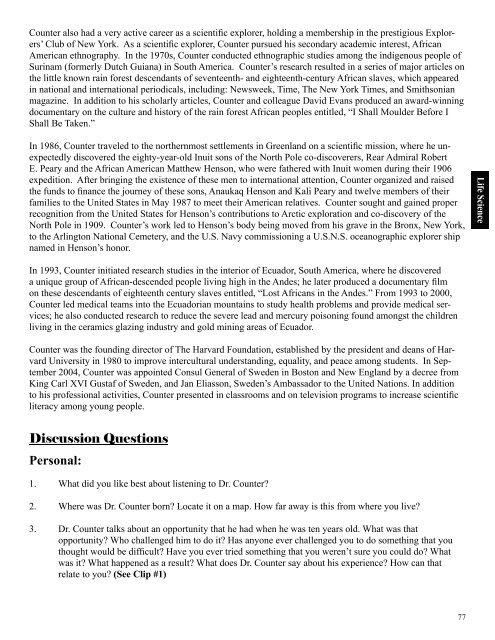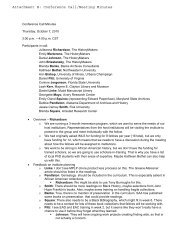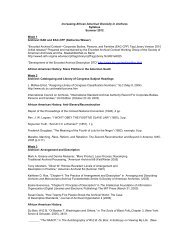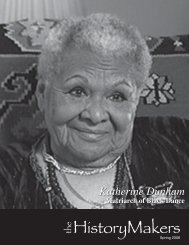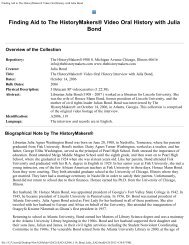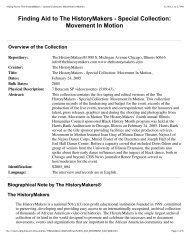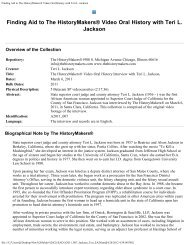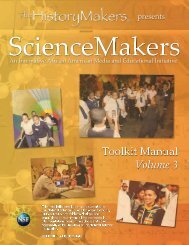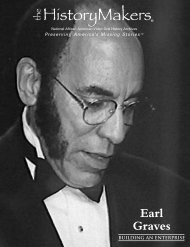ScienceMakers Toolkit Manual - The History Makers
ScienceMakers Toolkit Manual - The History Makers
ScienceMakers Toolkit Manual - The History Makers
You also want an ePaper? Increase the reach of your titles
YUMPU automatically turns print PDFs into web optimized ePapers that Google loves.
Counter also had a very active career as a scientifi c explorer, holding a membership in the prestigious Explorers’<br />
Club of New York. As a scientifi c explorer, Counter pursued his secondary academic interest, African<br />
American ethnography. In the 1970s, Counter conducted ethnographic studies among the indigenous people of<br />
Surinam (formerly Dutch Guiana) in South America. Counter’s research resulted in a series of major articles on<br />
the little known rain forest descendants of seventeenth- and eighteenth-century African slaves, which appeared<br />
in national and international periodicals, including: Newsweek, Time, <strong>The</strong> New York Times, and Smithsonian<br />
magazine. In addition to his scholarly articles, Counter and colleague David Evans produced an award-winning<br />
documentary on the culture and history of the rain forest African peoples entitled, “I Shall Moulder Before I<br />
Shall Be Taken.”<br />
In 1986, Counter traveled to the northernmost settlements in Greenland on a scientifi c mission, where he unexpectedly<br />
discovered the eighty-year-old Inuit sons of the North Pole co-discoverers, Rear Admiral Robert<br />
E. Peary and the African American Matthew Henson, who were fathered with Inuit women during their 1906<br />
expedition. After bringing the existence of these men to international attention, Counter organized and raised<br />
the funds to fi nance the journey of these sons, Anaukaq Henson and Kali Peary and twelve members of their<br />
families to the United States in May 1987 to meet their American relatives. Counter sought and gained proper<br />
recognition from the United States for Henson’s contributions to Arctic exploration and co-discovery of the<br />
North Pole in 1909. Counter’s work led to Henson’s body being moved from his grave in the Bronx, New York,<br />
to the Arlington National Cemetery, and the U.S. Navy commissioning a U.S.N.S. oceanographic explorer ship<br />
named in Henson’s honor.<br />
In 1993, Counter initiated research studies in the interior of Ecuador, South America, where he discovered<br />
a unique group of African-descended people living high in the Andes; he later produced a documentary fi lm<br />
on these descendants of eighteenth century slaves entitled, “Lost Africans in the Andes.” From 1993 to 2000,<br />
Counter led medical teams into the Ecuadorian mountains to study health problems and provide medical services;<br />
he also conducted research to reduce the severe lead and mercury poisoning found amongst the children<br />
living in the ceramics glazing industry and gold mining areas of Ecuador.<br />
Counter was the founding director of <strong>The</strong> Harvard Foundation, established by the president and deans of Harvard<br />
University in 1980 to improve intercultural understanding, equality, and peace among students. In September<br />
2004, Counter was appointed Consul General of Sweden in Boston and New England by a decree from<br />
King Carl XVI Gustaf of Sweden, and Jan Eliasson, Sweden’s Ambassador to the United Nations. In addition<br />
to his professional activities, Counter presented in classrooms and on television programs to increase scientifi c<br />
literacy among young people.<br />
Discussion Questions<br />
Personal:<br />
1. What did you like best about listening to Dr. Counter?<br />
2. Where was Dr. Counter born? Locate it on a map. How far away is this from where you live?<br />
3. Dr. Counter talks about an opportunity that he had when he was ten years old. What was that<br />
opportunity? Who challenged him to do it? Has anyone ever challenged you to do something that you<br />
thought would be diffi cult? Have you ever tried something that you weren’t sure you could do? What<br />
was it? What happened as a result? What does Dr. Counter say about his experience? How can that<br />
relate to you? (See Clip #1)<br />
77<br />
Life Science


